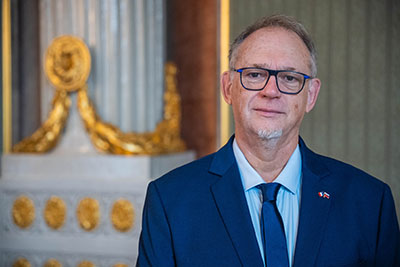 Internationally recognized expert in quantum materials physics,
Christophe Marcenat, a researcher at CEA-Irig/Pheliqs/Lateqs and as an invited researcher at the
Néel Institute, has received the prestigious international prize from the Slovak Academy of Sciences (SAS) in the field of natural sciences (awarded every three years for fields including mathematics, physics, biology, chemistry, medicine, etc.). This award recognizes the excellence of his scientific work—more than 170 publications in leading journals—as well as his innovative research, which led to the discovery of superconductivity in doped silicon, the element that forms the basis of today's semiconductor electronics.
Internationally recognized expert in quantum materials physics,
Christophe Marcenat, a researcher at CEA-Irig/Pheliqs/Lateqs and as an invited researcher at the
Néel Institute, has received the prestigious international prize from the Slovak Academy of Sciences (SAS) in the field of natural sciences (awarded every three years for fields including mathematics, physics, biology, chemistry, medicine, etc.). This award recognizes the excellence of his scientific work—more than 170 publications in leading journals—as well as his innovative research, which led to the discovery of superconductivity in doped silicon, the element that forms the basis of today's semiconductor electronics.
Christophe Marcenat has contributed significantly to the advancement of unique microcalorimetry methods, enabling the study of materials under extreme conditions: at ultra-low temperatures, under high pressure, and in intense magnetic fields.
His close collaboration with the Institute of Experimental Physics at SAS in Košice, which began with research on superconducting magnesium diboride (MgB2), has lasted for more than two decades. This Franco-Slovak collaboration has been supported by a European Marie Curie program (Transfer of Knowledge), as well as by bilateral projects within the framework of the Hubert Curien Partnership (PHC) Štefánik, which aims to strengthen scientific exchanges between the two countries and encourage the involvement of young researchers and doctoral students. Several of them completed part of their studies in the renowned laboratories in Grenoble and also benefited from Christophe Marcenat's skills and knowledge.
Recently, this fruitful cooperation has been reinforced by the Horizon 2020 project entitled “European Microkelvin Platform,” which aims to create a European research infrastructure in the field of ultra-low temperature and ultra-sensitive measurement techniques, with a particular focus on quantum technologies and materials.
(c) SAS/Martin Bystriansky